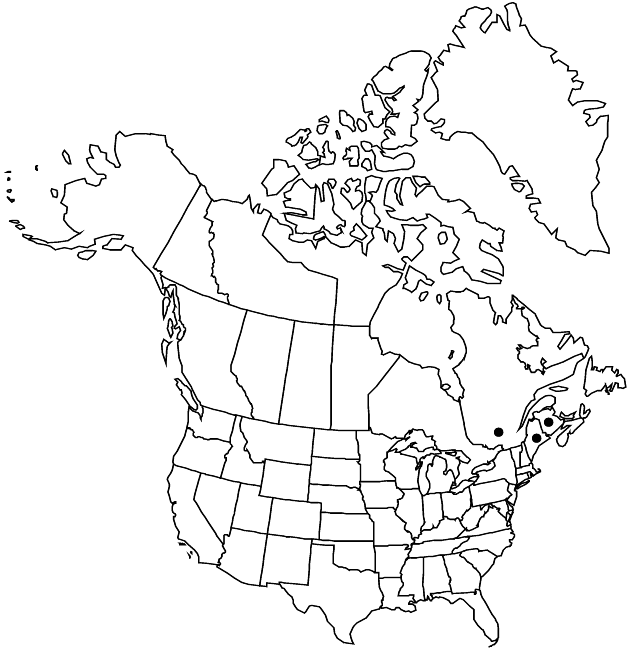Difference between revisions of "Symphyotrichum anticostense"
Phytologia 77: 275. 1995.
FNA>Volume Importer |
FNA>Volume Importer |
||
| Line 15: | Line 15: | ||
|name=Aster gaspensis | |name=Aster gaspensis | ||
|authority=Victorin | |authority=Victorin | ||
| − | }}{{Treatment/ID/Synonym | + | }} {{Treatment/ID/Synonym |
|name=Aster hesperius var. gaspensis | |name=Aster hesperius var. gaspensis | ||
|authority=(Victorin) B. Boivin | |authority=(Victorin) B. Boivin | ||
| Line 34: | Line 34: | ||
|distribution=N.B.;Que.;Maine. | |distribution=N.B.;Que.;Maine. | ||
|discussion=<p>Of conservation concern.</p><!-- | |discussion=<p>Of conservation concern.</p><!-- | ||
| − | --><p>Symphyotrichum anticostense is known from disjunct areas: western Lake St. John, southern Anticosti Island, southern streams of the Gaspé Peninsula (Quebec), Restigouche River (Quebec–New Brunswick), and St. John (New Brunswick) and Aroostook (Maine; A. Haines 2000) rivers. It is an allopolyploid derivative of the cross between the calcareous fen species S. boreale and the widespread shore species S. novi-belgii (J. Labrecque and L. Brouillet 1990). It hybridizes with S. novi-belgii.</p> | + | --><p><i>Symphyotrichum anticostense</i> is known from disjunct areas: western Lake St. John, southern Anticosti Island, southern streams of the Gaspé Peninsula (Quebec), Restigouche River (Quebec–New Brunswick), and St. John (New Brunswick) and Aroostook (Maine; A. Haines 2000) rivers. It is an allopolyploid derivative of the cross between the calcareous fen species <i>S. boreale</i> and the widespread shore species <i>S. novi-belgii</i> (J. Labrecque and L. Brouillet 1990). It hybridizes with <i>S. novi-belgii</i>.</p> |
|tables= | |tables= | ||
|references= | |references= | ||
| Line 58: | Line 58: | ||
|publication year=1995 | |publication year=1995 | ||
|special status= | |special status= | ||
| − | |source xml=https://jpend@bitbucket.org/aafc-mbb/fna-data-curation.git/src/ | + | |source xml=https://jpend@bitbucket.org/aafc-mbb/fna-data-curation.git/src/8f726806613d60c220dc4493de13607dd3150896/coarse_grained_fna_xml/V19-20-21/V20_1177.xml |
|tribe=Asteraceae tribe Astereae | |tribe=Asteraceae tribe Astereae | ||
|genus=Symphyotrichum | |genus=Symphyotrichum | ||
Revision as of 15:18, 18 September 2019
Perennials, 10–90 cm, colonial; long-rhizomatous. Stems 1, erect (straight, often reddish), glabrous. Leaves coriaceous, margins remotely serrulate or entire, slightly revolute, scabrous, apices mucronulate, faces glabrous; basal withering by flowering, long-petiolate (petioles narrowly winged, bases sheathing), blades lanceolate to oblanceolate, ca. 55+ × 3+ mm, bases slightly attenuate, apices acute; proximal cauline mostly withering by flowering, petiolate (petioles narrowly winged, sheathing), blades lanceolate or oblanceolate to linear-lanceolate or -oblanceolate, arcuate, 90–160 × 5–18 mm, bases cuneate to slightly attenuate, margins entire or serrulate, apices acute; distal sessile, blades linear to linear-lanceolate, 8–50 × 1.5–5 mm, progressively reduced distally, more strongly so in arrays, bases cuneate to rounded, sometimes slightly clasping, apices acute to acuminate. Heads in elongate, loosely racemiform arrays, branches ascending, heads single at ends of primary branches or long pedicels. Peduncles 0.8–5.7 cm, slender, sparsely ot moderately pilosulous, bracts 3–5, linear-lanceolate, often crowded proximal to and surpassing heads. Involucres campanulate, 6–10 mm. Phyllaries in 2–3 series, oblong-oblanceolate or -spatulate (outer) or oblong-lanceolate to linear-lanceolate or linear (inner), ± unequal, bases indurate 1/3–3/4, margins hyaline, scarious, erose distally, sparsely ciliolate distally, green zones lanceolate, outer often foliaceous distally, apices acute to long-acuminate, ± spreading, faces glabrous. Ray florets 25–44; corollas usually pale purple or lilac, sometimes white, laminae 9.5–20 × 0.7–1.4 mm. Disc florets 29–52; corollas yellow becoming reddish purple, 5–6 mm, tubes slightly shorter than funnelform throats, lobes lanceolate, 0.6–0.7 mm. Cypselae reddish tan, obovoid, compressed, 1.5–2.8 mm, 4–5-nerved, faces strigillose; pappi yellowish, 7–8 mm. 2n = 80.
Phenology: Flowering Aug–Sep.
Habitat: Calcareous, gravelly shores of rivers, lakeshore limestone pavements
Elevation: 0–100 m
Distribution

N.B., Que., Maine.
Discussion
Of conservation concern.
Symphyotrichum anticostense is known from disjunct areas: western Lake St. John, southern Anticosti Island, southern streams of the Gaspé Peninsula (Quebec), Restigouche River (Quebec–New Brunswick), and St. John (New Brunswick) and Aroostook (Maine; A. Haines 2000) rivers. It is an allopolyploid derivative of the cross between the calcareous fen species S. boreale and the widespread shore species S. novi-belgii (J. Labrecque and L. Brouillet 1990). It hybridizes with S. novi-belgii.
Selected References
None.